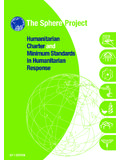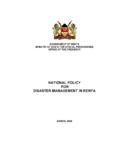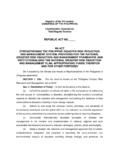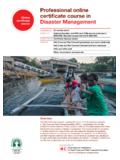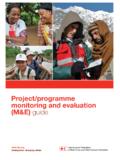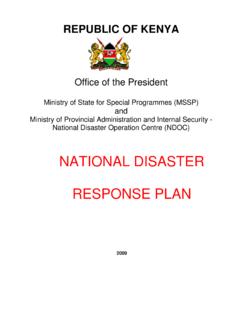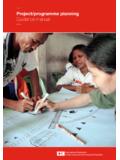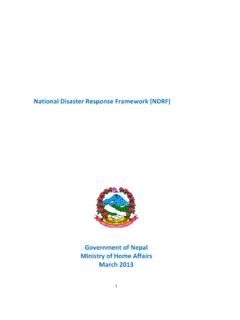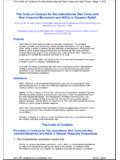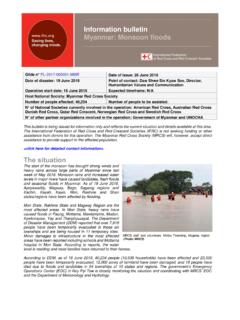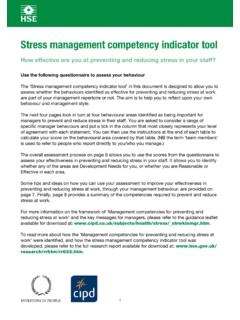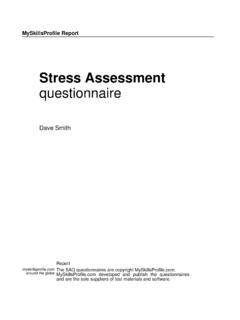Transcription of 152500-managing-stress-cover-en.qxd:English 1/23/09 10:19 ...
1 15250001/2009E2,000 Managingstressin the :English 1/23/09 10:19 AM Page 2 Cover photos: Howard DAVIES/International Federation2009 - Fourth edition (First edition 2001)International Federation of Red Cross and Red Crescent Box 372CH-1211 Geneva 19 SwitzerlandTel. : +41 22 730 4222 Fax : +41 22 733 0395E-mail: site: International Federation of Red Cross and Red Crescent SocietiesAny part of this handbook may be cited, copied, translated into other languages or adapted to meetlocal needs without prior permission from the International Federation of Red Cross and Red CrescentSocieties, provided that the source is clearly :English 1/23/09 10:19 AM Page is stress ?
2 3 Cumulative with traumatic psychological support programme for questionnaire on your personal signs of cumulative stress in the field / 1152500-managing- stress -en-V06:English 1/23/09 10:31 AM Page 1 IntroductionKnowledge and awareness of the effects of stress and trauma onhumanita-rian workers have gradually increased over the past reactions today are no longer seen as a sign of weakness orvulnerability but as a natural human reaction when confronted toextreme situations, violence and nature of humanitarian work has also drastically changed over the lastdecade.
3 Humanitarian workers have paid dearly in the face of violence andterrorism. Burn out and after-effects of traumatic experiences constitute amajor risk for humanitarian workers. After ten years of experience with del-egate stress , the Psychological Support Programme (PSP) team emphasizesthe importance of efficient stress International Federation of Red Cross and Red Crescent Societies has setup a PSP-team for their delegates in response to these needs. Since 1993 psy-chological support has been available to delegates in Geneva and publication has been conceived as a practical manual.
4 The differenttypes of stress experienced by delegates are described along with the associa-ted symptoms. It highlights the importance of identifying and knowing per-sonal, team and organisational resources. This second version has beenadapted to reflect updated needs and experiences. It incorporates a new self-assessment questionnaire at the end of the booklet. Increasing delegates knowledge of stress management will avoid potential risks to their psycho-logical and physical hope this booklet will encourage delegates to take care of themselves andeach other and to make full use of their your mission!
5 Markku NiskalaSecretary generalNovember 2003 - June 20082 / International Federation of Red Cross and Red Crescent Societies152500-managing- stress -en-V06:E nglish 1/23/09 10:31 AM Page 2 What is stress ? stress is normal. It is the body s natural reactionin response to a physical and/or emotional can be positive in activating a person s body, mind andenergy. It can be defined as an individual s capacity to mobilizeevery resource the body has to react promptly and adequately toany given situation. However, if stress lasts too long, the body sresources will be exhausted and the person will develop harmful ornegative forms of stress stressThis is baseline or underlying stress .
6 Basic stress may be caused byvarious sources of tensions at the individual, emotional, family or sociallevels. It may be increased by changes in the day-to-day environment(being away from family without adequate communication, workingwith new people from different cultures, uncertainty about work, newinformation to assimilate, etc.). Delegates need to be prepared for thisand learn how to develop strategies to cope with it. Basic stress normallydecreases after the first few weeks of a new stressThis follows prolonged exposure to work and non-work stress factorsand may develop into professional exhaustion known as burn out.
7 Burn outBurn out is an exhaustion of normal stress coping stress in the field / 3152500-managing- stress -en-V06:English 1/23/09 10:31 AM Page 34 / International Federation of Red Cross and Red Crescent SocietiesTraumatic stress or critical incident stressThis is caused by situations outside the range of everyday experience,where the delegate s life is perceived to be under immediate threat, or ifhe/she witnesses or is subject to violence or a natural a certain number of cases, traumatic stress may further develop intoPostTraumatic stress Disorder (PTSD)
8 , a pathological condition which willrequire referral to a mental health DAVIES/International Federation152500-managing- stress -en-V06: English 1/23/09 10:31 AM Page 4 Commonly reported causes of stressin the fieldDifficult living conditionsHeavy workload or inactivityRelationships and communicationCultural differencesLack of space and privacy/personality conflictsLack of leisure activities, social or cultural lifeInsecurityWar/security incidentsTarget for attack or robberyThreat to well-being/health risksLiving under security constraintsThreat of after-effects or reoccurrence of disasterRisk of accidents and illnessesLack of medical infrastructureChallenges to a person s values, ideals and beliefsExposure to acute consequences of war, disasters or human carnageExposure to the ongoing suffering and trauma of victimsCorruption.
9 Ambiguous situations or motivationsHostility of beneficiaries/unmet needs of beneficiariesStress related to the delegate s familyStress of accompanying partnerLack of communication with family back homeComing homeCommunication with family, friends, colleaguesGoing back to ordinary lifeFinancial instabilityWorry about future job opportunitiesManaging stress in the field / 5152500-managing- stress -en-V06:English 1/23/09 10:31 AM Page 56 / International Federation of Red Cross and Red Crescent SocietiesCumulative stressCumulative stress results from an accumulation of various stress factors suchasaheavyworkload,poorcommunications, thefrustrationofnotbeingableto meet the beneficiaries needs, having to cope with situations in which youfeel powerless, lack of basic comforts, and inability to rest or relax.
10 Undernormal circumstances, it can be monitored by adequate personal and teamstress management, but in some stressful situations such as disasters, cumu-lative stress can escalate quickly and develop into professional exhaustionknown as burn out .Cumulative stress is the most frequent form of stress encounteredin delegations. Delegates and heads of delegation should notunderestimate it. Although it is, to a large extent, inherent inhumanitarian and emergency work, staff must ensure that itremainswithinreasonablelimits, to recognize cumulative stress ?
